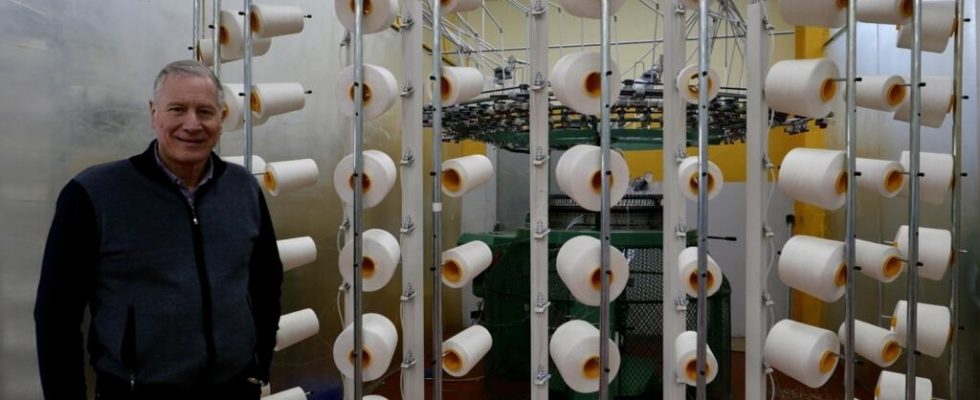The Malterre company, in Picardy, knits yarn to make fabric. After his grandfather, then his father, Laurent Malterre took over in the 1980s, in the midst of a wave of relocations. Thanks to his innovative spirit, and to risky bets, the entrepreneur has now become one of the essential links of “Made in France”.
Like every morning, Laurent Malterre went to have a coffee in the local bar, in Moreuil. A ritual, in this Picardy village where he was born, just like before him, “ his great-grandfather, grandfather and father “. But for some time now, the 65-year-old entrepreneur’s agenda has been less full, he hands over slowly to one of his sons. And he takes the time to look back. The textile industry is the story of his family. His grandfather made T-shirts. ” In 1940, he refused to collaborate with the Germans and was deported, I did not know him “.
After the war, her father, Louis Malterre, took over the factory and made swimwear. “ He was the third French producer, 300 people worked for him “. But in the 1975s, the textile industry in France, and particularly in the north where it was very established, suffered the brunt of relocations, first in the Maghreb, then in Asia. The factories are emptying, that of Laurent Malterre’s father is no exception. ” I saw him start a great company, I worked there every summer as a teenager, and then I saw him dive “. A trauma he remembers having experienced when he returned from his military service.
out of the box
Laurent Malterre was then in his twenties, with a diploma in finance and accounting as background, and a few machines from his father’s factory which had not found buyers. Without a clear idea of what his future would look like, he decided to relaunch the business. completely against the grain and begins to knit fabrics to make pajamas, ” a small market to survive, with a good dose of hack “. All this, despite his father’s words, ” textiles are fucked “. If the sexagenarian struggles to explain today why he embarked on this recovery, a priori doomed to failure, he blurts out: I always had a nature to get out of the box, at school they called me the eccentric “.
It is this very creative spirit that leads him to change his strategy. ” Instead of producing and selling, I decide to respond to requests and produce accordingly “. Which means being innovative. “ One day, a circus worker asks me if I can make him strips of fabric for the acrobats “. His brain is spinning. He tests, experiments, and after a year, succeeds in developing a very technical fabric. ” Strips for acrobats is a micro-market, but global! “.
Another request: a fabric for the fencing tracks, which is conductive, resistant, non-slippery. “ A new challenge, I tinker with something in one night, with scraps of tires, which I present the next day. And then little by little, I refined “. In ” listening to the market », he continues to innovate: thermal targets for special forces, coffin covers, hats for the medical sector, thermoregulating textiles for cancer patients, in particular. And always two guidelines for each of his projects: succeeding in a challenge, and giving meaning to what he does. He counts failures, customers who did not pay us and who put us in big trouble. We were in a survival position “. With the pressure of having a family to support. His wife joins the company as an accountant, “ a precious and indispensable help, it is she who puts my feet back on the ground “.
Success of “Made in France”
About ten years ago, however, he decided not to listen to her. It is the quivering of “Made in France”. ” Everyone said it was a fad and that it wasn’t going to turn into a mainstream trend. I threw myself into it headlong “. In 2012, the creator of the Lille brand La Gentle Factory, one of the first eco-responsible brands, came to see him. A collaboration begins, Malterre knits them organic or recycled cotton fabrics for T-shirts and sweatshirts.
Since then, other French brands have become part of its customers, and “Made in France”, which has become a real market, represents the bulk of its activity. He also knits linen, with a sector that has been reconstituted in Hauts-de-France, very recently. ” Everything is local, again, it makes sense, social and environmental “. The company’s order book is full, the 30 employees are not idle, things are turning, ” but I still keep this survival position in me, maybe that’s also my driving force. Nothing is acquired “.
Laurent Malterre wants to continue to change the image of the textile industry, “ a very negative image, which opposes that of the sequins of the fashion catwalks “. He also regularly opens the doors of his business to visitors. And when we tell him that “Made in France” is too expensive, he jumps up: ” It’s up to the consumer to ask the question: what’s behind a 2 or 3 euro T-shirt? “.
